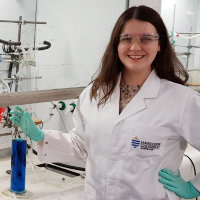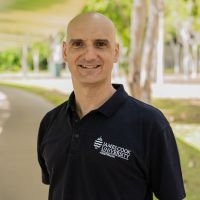Fast Facts
Location
Commencing
- Townsville: January, September
- Cairns: January, September
Fees
$8,120.00+
+estimated annual Commonwealth Supported Fee for a full-time study load. Please note this estimate is variable and subject to fluctuation depending on choice of elective subjects.
Plus Student Services and Amenities fee
Fee deferral and scholarships available if eligible
Currently displaying fees for 2025, which are subject to change in following years.
Duration
5 years full-time
Entry Requirements
ATAR 70
Recommended Knowledge
English (Units 3/4,C) and Mathematical Methods (Units 3/4,C)
QTAC Codes
- 314051
- 324051
Course detail
Prepare yourself to solve tomorrow’s challenges with a Bachelor of Engineering (Honours) — Bachelor of Science. Combine your passion for mathematical techniques and effective design with the technical knowledge and theory of scientific study. You’ll learn the core concepts of engineering and specialise in the scientific field of your choice, with each area equipping you to develop creative solutions to complex problems and discover new knowledge and ways of working through in-depth research.
Studying the Bachelor of Engineering (Honours) — Bachelor of Science degree will give you the essential knowledge and skills for two highly competitive industries. Your unique blend of expertise in your chosen areas of engineering and science will enable you to stand out to future employers. Each of your specialisations within engineering and science will complement each other, with the theory of one field informing and broadening your understanding of the other. You’ll have hands-on experience in each degree, giving you the skills you need to graduate with confidence no matter what industry or field you pursue.
Students who are based in Townsville and have completed at least one year of their degree are eligible to apply for an Australian Public Service Academy Campus position. With opportunities in the Digital and Data spheres, you can align your studies to part-time work, that may translate into a full-time job offer upon graduation. Explore the APS Data and Digital Programs page for more information.
Engineering
In your Engineering (Honours) course, prepare yourself for the challenges of today and tomorrow through industry-based teaching. Build a thorough understanding of engineering fundamentals in your first year with theoretical and practical learning. You will study a specialised major, with honours-level content integrated throughout.
Participate in 12 weeks of industry-based practical placement – you may even be paid for your work experience. Studies culminate in your final year with an honours component, where you will complete a major engineering project and thesis.
Science
Benefit from the flexibility of a JCU science course and develop your passion in your chosen field. Learn from world-renowned lecturers and conduct hands-on research in North Queensland’s unique tropical environment.
You will learn the fundamentals of science, before choosing from 10 different science majors to suit your interests.
Become a world-class engineering and science professional. Experience the benefits of a joint degree and graduate with a broad skillset that is highly sought-after in the local and global economy.
View the Handbook for a detailed overview of available subjects.
Experience the Incredible
Become highly desirable to employers as you leverage the unique cultural and environmental opportunities only JCU can offer. Develop as a scientist as you work alongside world-class researchers in JCU's state-of-the-art research facilities. Prepare to succeed through courses with small class sizes and learn from industry-leading engineering lecturers committed to student success.
Gain a special mastery of the challenges facing engineering and scientific research in the tropics through your access to World Heritage sites and world-class research stations. Be a versatile and flexible scientist as you work within cultural contexts to understand the needs of marginalised people and the challenges of marrying economic growth and environmental sustainability.
Gain valuable experience in modern laboratories through courses designed around real industry needs and practical work placements. Graduate ready to enter the job market with a degree accredited by Engineers Australia.
Ready Today for Tomorrow with An Engineering Science Degree
Tomorrow's problems are complex; be ready to meet them with an engineering science degree and your chosen specialisation. Your world-class education begins here, as you develop your career goals with help from passionate lecturers and tutors. Prepare to surpass your goals as you qualify to work in many industries throughout the engineering and scientific fields.
Explore different career pathways with a Bachelor of Engineering (Honours) - Bachelor of Science from JCU. The following are some of the Science specialities you could choose.
Chemistry
Build a strong foundation of knowledge and skills in organic and inorganic chemistry, kinetics and the cutting-edge instrumental techniques you will need to succeed. Work anywhere in the world with a degree accredited by the Royal Australian Chemical Institute. Develop your professional network through access to award-winning laboratories, top researchers in the field and visits to local industries.
Data Science
Become an expert in the tech driving today's most sought-after jobs. Master the sophisticated algorithms that are leveraging Big Data and changing everything about how modern businesses work. Be ready to work anywhere with your skills in analytics and machine learning, including government, healthcare, finance and internet start-ups.
Marine Biology
Develop your understanding of the world with access to one of Earth's most diverse ecosystems, the Great Barrier Reef, and gain hands-on skills at JCU's Orpheus Island Research Station. Build skills that are applicable to all areas of marine biology as you see first-hand how ecosystems interact and how human activity affects them.
Physics
Make a difference as a leader ready to tackle the most challenging questions in the universe. Build a strong foundation of theoretical knowledge, then apply that knowledge in practical situations in energy development, quantum mechanics, weather and climate research or biophysics. Prepare yourself for a rewarding career in telecommunications, aerospace, meteorology, health, energy production, or wherever your interests take you.
Change the World With an Engineering Science Degree
Lead the way in addressing our world's greatest challenges. Graduate from JCU ready to bring meaningful answers to humanity's most pressing questions, with a joint degree that offers unique opportunities in study, research, skills development and professional networking.
Hide additional information
Inherent requirements
Inherent requirements are the identified abilities, attributes, skills, and behaviours that must be demonstrated, during the learning experience, to successfully complete a course. These abilities, attributes, skills, and behaviours preserve the academic integrity of the University’s learning, assessment,and accreditation processes, and where applicable, meet the standards of a profession. For more information please review the inherent requirements for the Bachelor of Engineering (Honours) - Bachelor of Science.
Majors
You can choose from 5 different Engineering majors. Not all majors are available at all campuses.
Chemical Engineering
Learn how to create new products from raw materials using principles of engineering and sustainability. Gain an in-depth understanding of how chemistry, physics, mathematics and design techniques can be combined to solve some of the world’s most challenging problems. Your skills in chemical engineering can lead you to a diverse career in industries such as water and wastewater treatment, food manufacturing, energy production and minerals processing.
Civil Engineering
Benefit from JCU’s expert lecturers and explore various civil engineering disciplines such as structural, hydraulic, geotechnical, transport and environmental engineering. Develop the skills required to assess the environmental impact of large projects and understand how to build community engagement. JCU graduates have a thorough understanding of how to make cities better places to live.
Electrical and Electronic Engineering
Learn how to design and maintain electrical energy infrastructure through the application of the electrical principles. You will integrate theory with practice and visit telecommunications companies, power utilities and mines. Build a comprehensive knowledge of electrical materials, circuit theory, single phase and three phase power system modelling and signal processing.
Explore Electrical Engineering
Electronic Systems and Internet of Things (IoT) Engineering
Develop sensor technologies, analyse big data and design smart technology that relates to various industries. Work with cloud computing and wireless communication utilising a state-of-the-art Internet of Things research lab. Become innovative technology leaders, accessing world-class lecturers and their strong industry partnerships.
Explore Internet of Things Engineering
Mechanical Engineering
Understand the principles of mechanics and thermodynamics to analyse, design, manufacture and maintain machines across almost all industries. Learn the foundations of thermofluid mechanics and the dynamics of machine elements. Through experiential learning, apply your understanding of heat exchange, momentum and strength of materials to design machines.
There are 10 Science majors to choose from. You can choose to study one or two majors. Not all majors are available at all campuses.
Aquaculture Science and Technology
With lecturers who are world-leaders in tropical aquaculture research and development, discover the sustainable practices of aquaculture. Access to the JCU Marine and Aquaculture Research Facility will enhance your knowledge and provide current practical skills.
Throughout this major, you will explore the scientific and practical applications of breeding, rearing and harvesting of plants and animals in all types of water environments. You will understand the biodiversity of species and how they are farmed, the design of aquaculture systems, and the basics of nutrition.
With a focus on tropical species, our researchers’ strong links to industry will give you a sound professional network when you graduate. Career opportunities include jobs in hatcheries, stock nutrition programs and management, fresh water and marine farming, or aquaculture research.
Chemistry
Study in award-winning laboratories and gain an insight into the industry with excursions to local companies in the chemistry industry. You will benefit from small class sizes and the personalised approach of our lecturers.
Gain current skills and explore the many areas of chemistry including analytical chemistry, synthetic, organic and inorganic chemistry, and kinetics and mechanisms of chemical reactions. In your third year, you will learn a number of instrumental techniques widely used in the industry.
Accredited by the Royal Australian Chemical Institute (RACI), this chemistry major will open up career opportunities both nationally and internationally. Working across a number of industries, job prospects could include analytical chemists, research chemists, clinical diagnosticians, forensic scientists or environmental scientists.
Data Science
Data and analytics capabilities have made a leap forward in recent years. The volume of available data has grown exponentially, more sophisticated algorithms have been developed, and computational power and storage have steadily improved.
Career opportunities in data science, big data and analytics are growing dramatically. Data scientists work in every industry – from defence departments to internet start-ups and financial institutions – and tackle big data projects on every level. They are among the most sought-after jobs in the tech world today.
The Data Science major packages existing data science subjects together with new subjects on Data Visualisation, Big Data and Machine Learning.
Environmental Earth Science
Get hands-on with your studies through a diverse mix of field work in unique locations and research opportunities within the biodiverse region of Far North Queensland.
Examine the impacts of human development on the natural environment, particularly within climate, hydrology, soil quality and coastal catchments. Graduates develop expertise in field work processes, data analysis and report writing and are skilled at innovation and problem-solving in environmental management.
Explore Environmental Earth Science
Geology
Be part of the drive to discover, secure and utilise critical minerals as you explore the broad applications of geology, a field concerned with the structure and composition of the earth.
Build your capabilities as an innovative problem-solver and develop your on-site skills through field trips. You’ll build experience as you draw on our connections with industry partners and explore opportunities to participate in current geological research projects.
You’ll benefit from a degree of flexibility through subject choices, equipping you to explore a combination of geochemistry, critical mineral exploration or environmental process, depending on your interests. Graduate with practical analysis and investigation skills that will equip you to take on opportunities within the mining and minerals sector, renewable energy or environmental assessment.
Marine Biology
Learn from lecturers who are world-leaders and be equipped to address critical challenges facing marine and coastal ecosystems. You will study in a location that gives you access to one of the most diverse and fragile marine ecosystems in the world, the Great Barrier Reef.
By studying the surrounding habitats of the Great Barrier Reef, you will discover the impact that humans have on the marine environment and how the oceans and atmosphere interact. You will gain valuable employability skills through practical experiments and opportunities to visit the JCU Orpheus Island Research Station.
Benefit from our researchers’ strong links with industry including the Great Barrier Reef Marine Park Authority (GBRMPA), TropWater and CSIRO Townsville. As a marine biologist, you could work in conservation biology and policy, environmental and resource management, fisheries biology, ecosystem restoration and marine impact assessments.
Mathematics
Develop the problem-solving, analytical and quantitative reasoning skills that are highly sought-after by employers worldwide. With small class sizes, you will get the one-on-one support required to excel as a mathematician.
Understand a number of mathematical techniques, data analysis, and multivariate statistical methods. You will learn how to formulate mathematical models to illustrate science and engineering problems, and use various techniques to help find solutions.
To enhance your employability skills, you have the flexibility to combine this major with another science major. As a mathematician, you can work in many sectors such as information technology, animated films, business and finance, astronomy and space exploration, climate study or meteorology, cryptography, and applied research.
Molecular and Cell Biology
Learn how to amplify and edit DNA sequences and conduct laboratory-based and field-based projects. Throughout your degree, you will study the basis of health and disease at a molecular level and analyse the functions of a whole cell.
Gain hands-on experience using cutting-edge equipment and techniques. Study biochemistry, microbiology, biotechnology and bioinformatics, and have an in-depth understanding of molecular genetics. These structures and processes form the basis of all living matter and provide insights into complex biological interactions.
Develop the foundations needed to work towards developments of modern medicine and biotechnology. You will have the knowledge to work across a breadth of industries — job opportunities include working in research laboratories, hospital and diagnostic departments, and biotech or pharmaceutical companies.
Explore Molecular and Cell Biology
Physics
Explore some of the universe’s most challenging questions. Accredited by the Australian Institute of Physics, this major will give you a broad range of practical and theoretical skills across various physics disciplines.
Physicists study the laws of nature; you will learn the fundamentals of energy, quantum mechanics, relativity, antimatter, weather and climate. Develop your ability to think critically and be experimental by exploring biophysics, molecular electronics, and organic solar cells. You will study the structure of matter, atomic and nuclear physics, quantum physics, oceanography and meteorology, and thermodynamics.
As a physicist, your skills are relevant to a diverse number of careers. Job opportunities exist in industrial, scientific and educational occupations in fields such as health, meteorology, mining, environmental monitoring, energy production, telecommunications, and aerospace.
Please note: mid-year entry is not available for the Physics major.
Zoology and Ecology
Have the opportunity to learn from lecturers with global standing, study amazing rainforests and diverse species, and go on field trips to Borneo or the Galapagos Islands. Offered at both our Townsville and Cairns campuses, you will study in one of the most biodiverse regions in Australia.
Study the science of the biology of plants and animals and the natural world that they live in. Discover many of the environmental threats to the Tropics by studying the effects of deforestation, infrastructure expansion, habitat fragmentation, over-hunting, and invasive species.
You will access the various environments of the Wet Tropics and our Daintree Rainforest Observatory to learn about biosecurity, behavioural ecology, conservation biology and ecological modelling. Potential job opportunities include wildlife or environmental consultant or zoologist or ecologist for a conservation, quarantine or biosecurity organisation.
Refer to the handbook for a detailed overview of each major and minor available.
The Handbook provides detail about the subjects you can study within each major.
Honours
An Honours degree supports entry into a Higher Degree by Research. High-achieving graduates of this course can enrol in this extra year and further develop critical thinking skills through completion of a research project and thesis. Refer to the Course Handbook for eligibility information.
Combining Engineering and Science qualifications give JCU graduates a wide range of employment and career opportunities.
Graduates pursue careers in various areas including hospitals, resource management, defence agencies, scientific and technological research, mathematics, conservation, environmental science, chemistry, mining, or biotechnology.
You could find employment as an aerospace avionics engineer, chemical engineer, civil engineer, electrical engineer, mechanical engineer, biomedical specialist, environmental scientist, mathematician, or AI machine learning specialist. Alternatively, go on to study the Bachelor of Science (Honours).
Graduates may be eligible for membership with the following organisations:
- Australasian Institute of Mining and Metallurgy
- Engineers Australia
- Institution of Chemical Engineers
- Australian Institute of Physics
Graduates who major in Chemistry may be eligible to register for non-corporate membership of the Royal Australian Chemical Institute (RACI). With an additional three years of Chemistry experience, they may be eligible to register as a Chartered Chemist with Corporate Membership of RACI.
View the Handbook for more information.
Entry score threshold
These are the lowest adjusted scores we made an offer to in Semester 1, 2024. Entry scores are based on the most recent Semester 1 intake and are updated in June each year. Meeting the threshold doesn't guarantee admission.
ATAR/Selection Rank: 70.00
Entry score range
This table shows the range of entry scores for recent secondary students offered a place in the Bachelor of Engineering (Honours) - Bachelor of Science for Semester 1, 2024. The table includes offers deferred to Semester 1, 2024 which may have been assessed using the entry score threshold of an earlier year.
JCU Townsville
Without adjustments | With adjustments* | |
|---|---|---|
Highest | 98.05 | 99.95 |
Median | 86.45 | 92.40 |
Lowest | 66.00 | 72.00 |
JCU Cairns
Without adjustments | With adjustments* | |
|---|---|---|
Highest | <5 | <5 |
Median | <5 | <5 |
Lowest | <5 | <5 |
Notes:
<5 – indicates less than 5 OP/ATAR-based offers made.
* Refer to Adjustment Factors
Find out more about who you might study with by viewing this course’s student profile.
Adjustment factors
James Cook University applies bonus ranks under the Regional Preference Scheme and QTAC’s Educational Access Scheme (EAS). Learn more about JCU’s adjustment factors.
Estimated annual Commonwealth Supported fee: $AUD8,120.00
A variety of Scholarships are available to suit different student types.
JCU Prep provides a pathway into this course. Enrolling in this flexible program will enable you to meet entry requirements including subject pre-requisites and ATARs. Introductory academic subjects are also available to prepare you for tertiary study.
*Excludes entry into the Bachelor of Advanced Science, Bachelor of Dental Surgery, Bachelor of Laws, Bachelor of Marine Science, Bachelor of Medicine, Bachelor of Surgery, Bachelor of Nursing Science – Bachelor of Midwifery, Bachelor of Pharmacy (Honours), Bachelor of Physiotherapy, and Bachelor of Veterinary Science (Honours).
Note the course QTAC code for the location you've chosen. You'll need to enter it as part of your QTAC application.
Application dates vary between courses, whether they're delivered in semester, trimester or carousel study modes. View our Application due dates page for more information.
ATAR score is indicative only. Entry scores will be finalised in the major offer round.
Real stories
-

Student
Riley Coleman
Bachelor of Engineering (Honours) and Bachelor of Science
Studying a dual degree at JCU allowed me to delve deeper into the content I was passionate about and gave me the chance to see my field from both a hands-on and theoretical perspective. It allowed me to gain invaluable experience through field trips, industrial opportunities, and a strong focus on teamwork.
-

Alumni
Tayla Corbett
Bachelor of Engineering (Honours) and Bachelor of Science
There are many opportunities to work with and interact with fellow students and lecturers. There is also a great student support community in engineering and science. The best part of my degree was completing 12 weeks of vacation placement, giving me the opportunity to experience work with industry.
-

Lecturer
George Vamvounis
Senior Lecturer, Chemical Engineering
This program offers a unique opportunity combing the fundamental sciences, with the applied engineering program. This combination positions graduates well as they have a deep understanding of the fundamental underpinnings of Engineering. This skill set is becoming important in solving the world’s grand challenges.
-

Employer
Jim Greatorex
GHD
Approximately 75% of our professional staff in North Queensland have studied engineering at JCU. GHD continues to prioritise students that have studied locally as the quality of education and resilience of character that local graduates bring to our business is exceptional.